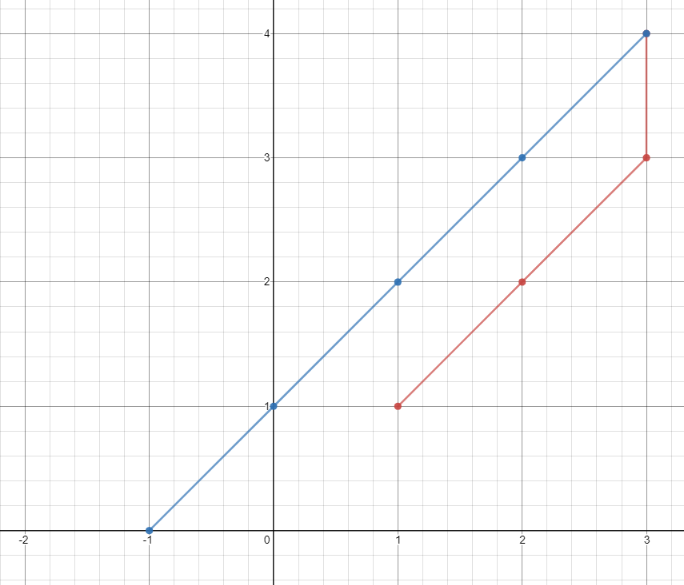On a 2D plane, there are n points with integer coordinates points[i] = [xi, yi]. Return the minimum time in seconds to visit all the points in the order given by points.
You can move according to these rules:
- In
1second, you can either:- move vertically by one unit,
- move horizontally by one unit, or
- move diagonally
sqrt(2)units (in other words, move one unit vertically then one unit horizontally in1second).
- You have to visit the points in the same order as they appear in the array.
- You are allowed to pass through points that appear later in the order, but these do not count as visits.
Example 1:
Input: points = [[1,1],[3,4],[-1,0]] Output: 7 Explanation: One optimal path is [1,1] -> [2,2] -> [3,3] -> [3,4] -> [2,3] -> [1,2] -> [0,1] -> [-1,0] Time from [1,1] to [3,4] = 3 seconds Time from [3,4] to [-1,0] = 4 seconds Total time = 7 seconds
Example 2:
Input: points = [[3,2],[-2,2]] Output: 5
Constraints:
points.length == n1 <= n <= 100points[i].length == 2-1000 <= points[i][0], points[i][1] <= 1000
class Solution:
def minTimeToVisitAllPoints(self, points: List[List[int]]) -> int:
return sum(
max(abs(p1[0] - p2[0]), abs(p1[1] - p2[1])) for p1, p2 in pairwise(points)
)class Solution {
public int minTimeToVisitAllPoints(int[][] points) {
int ans = 0;
for (int i = 1; i < points.length; ++i) {
int dx = Math.abs(points[i][0] - points[i - 1][0]);
int dy = Math.abs(points[i][1] - points[i - 1][1]);
ans += Math.max(dx, dy);
}
return ans;
}
}class Solution {
public:
int minTimeToVisitAllPoints(vector<vector<int>>& points) {
int ans = 0;
for (int i = 1; i < points.size(); ++i) {
int dx = abs(points[i][0] - points[i - 1][0]);
int dy = abs(points[i][1] - points[i - 1][1]);
ans += max(dx, dy);
}
return ans;
}
};func minTimeToVisitAllPoints(points [][]int) (ans int) {
for i, p := range points[1:] {
dx := abs(p[0] - points[i][0])
dy := abs(p[1] - points[i][1])
ans += max(dx, dy)
}
return
}
func max(a, b int) int {
if a > b {
return a
}
return b
}
func abs(x int) int {
if x < 0 {
return -x
}
return x
}function minTimeToVisitAllPoints(points: number[][]): number {
let ans = 0;
for (let i = 1; i < points.length; i++) {
let dx = Math.abs(points[i][0] - points[i - 1][0]),
dy = Math.abs(points[i][1] - points[i - 1][1]);
ans += Math.max(dx, dy);
}
return ans;
}impl Solution {
pub fn min_time_to_visit_all_points(points: Vec<Vec<i32>>) -> i32 {
let n = points.len();
let mut ans = 0;
for i in 1..n {
let x = (points[i - 1][0] - points[i][0]).abs();
let y = (points[i - 1][1] - points[i][1]).abs();
ans += x.max(y);
}
ans
}
}#define max(a, b) (((a) > (b)) ? (a) : (b))
int minTimeToVisitAllPoints(int **points, int pointsSize, int *pointsColSize) {
int ans = 0;
for (int i = 1; i < pointsSize; i++) {
int x = abs(points[i - 1][0] - points[i][0]);
int y = abs(points[i - 1][1] - points[i][1]);
ans += max(x, y);
}
return ans;
}
